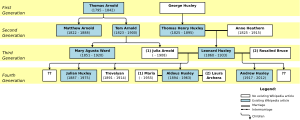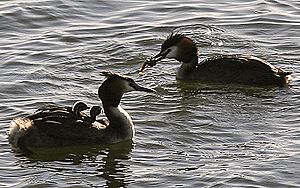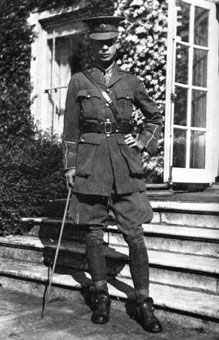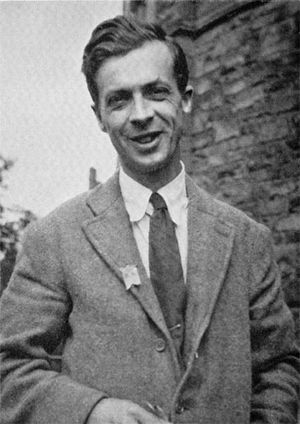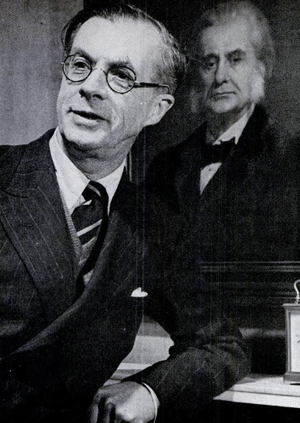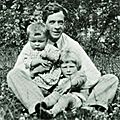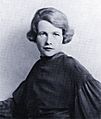Julian Huxley facts for kids
Quick facts for kids
Sir
Julian Huxley
|
|
|---|---|
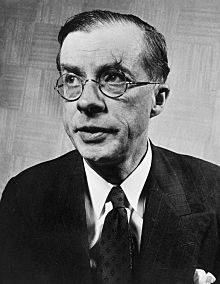
Julian Huxley c. 1964
|
|
| 1st Director-General of UNESCO | |
| In office 1946–1946 |
|
| Succeeded by | Jaime Torres Bodet |
| Personal details | |
| Born |
Julian Sorell Huxley
22 June 1887 London, England |
| Died | 14 February 1975 (aged 87) London, England |
| Residence | United Kingdom |
| Alma mater | Balliol College, Oxford |
| Known for | Modern synthesis, Humanism, UNESCO, Conservation, Eugenics |
| Awards | Kalinga Prize (1953) Darwin Medal Darwin-Wallace Medal (Silver, 1958) Lasker Award |
| Scientific career | |
| Fields | Evolutionary biology |
| Institutions | Rice Institute, Oxford University, Kings College London, Zoological Society, UNESCO |
| Influences | T. H. Huxley, W. G. (Piggy) Hill |
| Influenced | E. B. Ford, Gavin de Beer, Aldous Huxley |
| Military career | |
| Allegiance | United Kingdom |
| Service/ |
British Army |
| Years of service | 1917-1919 |
| Rank | Second Lieutenant |
| Unit | Royal Army Service Corps Intelligence Corps |
| Battles/wars | First World War |
Sir Julian Sorell Huxley (born June 22, 1887 – died February 14, 1975) was a famous British scientist. He was an evolutionary biologist, which means he studied how living things change over time. He also supported the idea of natural selection, which is how species adapt to their environment.
Julian Huxley was a key person in the "modern synthesis" of evolution in the mid-1900s. This was a big step in understanding how evolution works. He was also the first Director-General of UNESCO, an important international organization. He helped start the World Wildlife Fund and was the first president of the British Humanist Association.
Huxley was great at explaining science to everyone. He wrote many books and articles. He also appeared on radio and television. He even directed a wildlife film that won an Oscar! He received several awards for his work. These included the Kalinga Prize in 1953 for making science popular. He also got the Darwin Medal in 1956 and the Darwin–Wallace Medal in 1958. In 1958, he was also made a "Sir" (knighted). This was 100 years after Charles Darwin and Alfred Russel Wallace first shared their ideas on evolution.
Huxley was interested in ideas about improving humanity through science and technology. He used the word "transhumanism" to describe this idea. This meant using science to make people and society better. A pub in Selsdon, England, is named after him. It is near the Selsdon Wood Nature Reserve, which he helped create.
Contents
Early Life and Education
Julian Huxley came from a very famous family. His brother was the well-known writer Aldous Huxley. His half-brother, Andrew Huxley, was also a biologist and won a Nobel Prize. His father, Leonard Huxley, was a writer and editor. His grandfather was Thomas Henry Huxley, a close friend and supporter of Charles Darwin.
Julian was born in London, England, on June 22, 1887. He grew up in Surrey, England. From a young age, he loved nature. His grandfather, Thomas Henry Huxley, taught him a lot about the natural world.
When he was 13, Julian went to Eton College, a famous school. He continued to be very interested in science there. His grandfather had even helped the school build science labs earlier. At Eton, he became very keen on ornithology, which is the study of birds.
In 1905, Julian won a scholarship to study Zoology at Balliol College, Oxford. He started at Oxford in 1906. In 1908, he won a special poetry prize called the Newdigate Prize. He graduated with top honors in 1909. That same year, he attended a big event in Cambridge. It celebrated 100 years since Darwin's birth. It also marked 50 years since Darwin's book On the Origin of Species was published.
Career and Contributions
After graduating, Julian Huxley received a scholarship. This allowed him to spend a year at the Naples Marine Biological Station. In 1910, he became a demonstrator at Oxford University. He began studying water birds like the common redshank and grebes. His childhood interest in bird watching led him to this work.
In 1914, he wrote an important paper about the Great Crested Grebe. This paper was later published as a book. It made his scientific ideas easy and fun for everyone to understand.
In 1912, Huxley was asked to start a new Biology Department. This was at the new Rice Institute (now Rice University) in Houston, Texas. He accepted the job and visited the United States to prepare.
War Service and Return to Academia
In September 1916, Huxley returned to England. He wanted to help with the war effort during World War I. He joined the Royal Army Service Corps in 1917. Later, he transferred to the British Army Intelligence Corps in 1918. He worked in Sussex and then in northern Italy.
After the war, he became a Fellow at New College, Oxford. He also became a Senior Demonstrator in the Zoology Department at the university.
In 1925, Huxley became a Professor of Zoology at King's College London. However, in 1927, he decided to leave his teaching job. He wanted to work full-time with the famous writer H. G. Wells and his son, G. P. Wells. Together, they wrote a book called The Science of Life. He still kept a connection with King's College as an Honorary Lecturer. From 1927 to 1931, he also gave yearly lectures at the Royal Institution.
Travel and Conservation Work
In the 1930s, Julian Huxley traveled a lot. He took part in many scientific and political activities. In 1931, he visited the USSR. He was impressed by their large-scale social and economic plans. Later, back in the UK, he helped start a group called Political and Economic Planning.
He also visited Kenya and other East African countries. He wanted to see the conservation work being done there. This included creating national parks to protect nature. From 1933 to 1938, he was part of a committee for a big survey of Africa.
In 1935, Huxley became the secretary of the Zoological Society of London. For the next seven years, he managed the society and its zoos. These included the London Zoo and Whipsnade Park. He made many improvements, like creating a "Pets Corner" for children. He also encouraged curators to talk to kids and started a Zoo Magazine.
In 1941, Huxley went to the United States for a lecture tour. He caused some debate by saying the US should join World War II. A few weeks later, the attack on Pearl Harbor happened, and the US joined the war. It was hard for him to get back to the UK, so his tour was extended.
In 1943, the British government asked him to join a commission. This group was to find places in West African Commonwealth countries to build universities. While there, he got sick with hepatitis. He had a serious illness and it took him a whole year to get better.
International and Scientific Legacy
Julian Huxley was always interested in international cooperation and education. He played a big part in creating the United Nations Educational, Scientific and Cultural Organization (UNESCO). In 1946, he became the first Director-General of this important organization.
His interest in international issues and protecting nature also led him to help set up the WWF. This is now known as the World Wide Fund for Nature.
Huxley's scientific interests were very broad. He studied evolution, animal behavior (ethology), how living things develop (embryology), and genetics. He also studied anthropology (the study of human societies) and cell biology. His strong support for evolution and his work on the modern synthesis earned him major awards. These included the Darwin Medal in 1956 and the Darwin–Wallace Medal in 1958.
Huxley was a friend and mentor to many scientists. He taught and encouraged many others in their studies. He was a great naturalist, like his famous grandfather. He helped many people accept the idea of natural selection. His ideas were global and hopeful. He believed in progress and using evolution to improve humanity. He was also one of the people who signed the Humanist Manifesto II.
Images for kids
-
English Heritage blue plaque at 16 Bracknell Gardens, Hampstead, London, commemorating Julian, his younger brother Aldous, and father Leonard
See also
 In Spanish: Julian Huxley para niños
In Spanish: Julian Huxley para niños
 | Misty Copeland |
 | Raven Wilkinson |
 | Debra Austin |
 | Aesha Ash |


